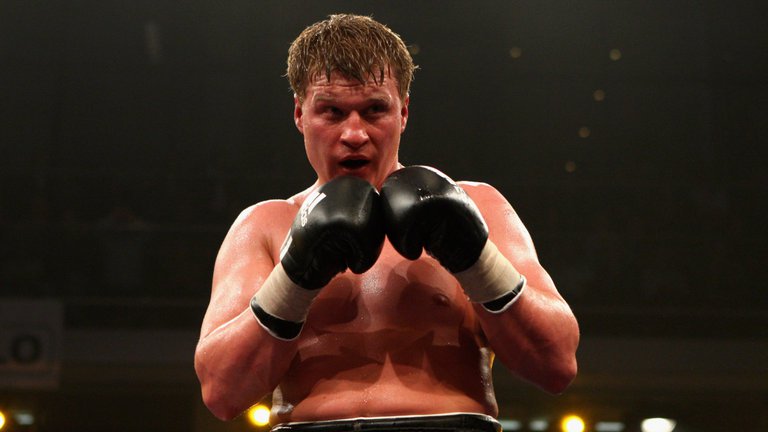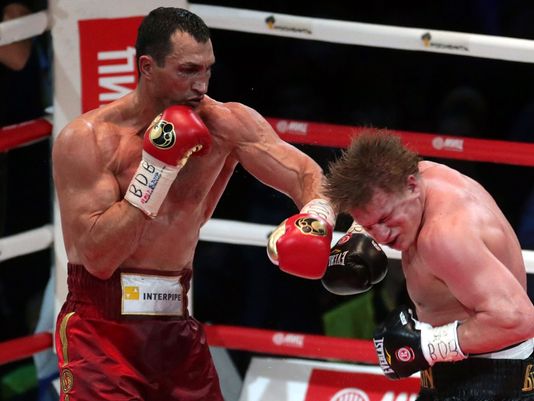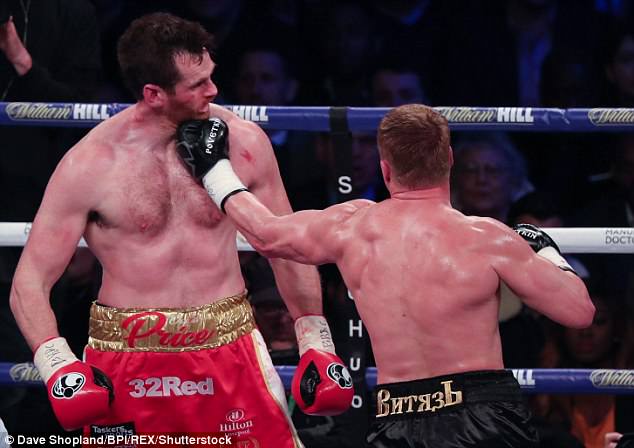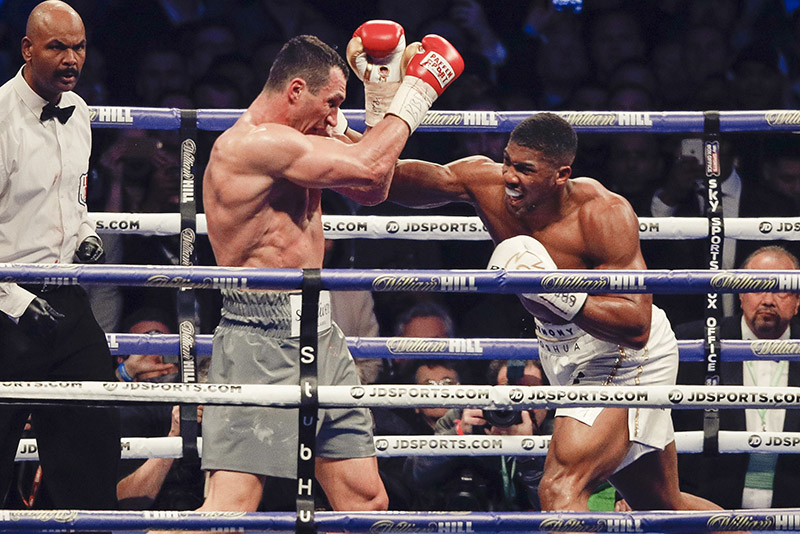
The good guy/bad guy narrative tends to write itself when one competitor has tested positive for a banned substance and the other athlete has not.
If the former has failed two tests, well, that augments the position of the man who adopts the villain’s role.
Regardless of the rights and wrongs committed prior to Alexander Povetkin’s challenge of IBF/WBA/WBO heavyweight titlist Anthony Joshua, they will fight.
When the bell sounds in the cool open air of London, on September 22, two men will meet in the middle of the ring and any kinds of politics, weeks of training and media build-up will become irrelevant, forgotten as quickly as the initial jabs that will cast the pre-fight talk to the archives.
Povetkin has been preparing in Chekhov in an old, weathered compound for Russian athletes about 31 miles from the center of Moscow. The place looks like it might have been used in Ivan Drago’s heyday but not been renovated since.
His profile has been deliberately low. He maintains that, despite his advancing years, motivation is still high.
Povetkin has enlisted the help of yet another ambitious British heavyweight currently working his way along one of the sport’s longest conveyor belts, Daniel Dubois. It prompted some rival heavyweights – including unbeaten prospect Joe Joyce – to pour scorn on Dubois’ commitment to the British boxing fraternity and the flag, the same way some questioned George Groves going into camp with Mikkel Kessler, ahead of the Dane’s challenge of Carl Froch. Joyce reportedly turned down the chance to join the Russian’s camp. Dubois would, of course, have seen it as an opportunity to further his own ring education, just as Groves did. It’s nothing personal, just business. There has, by the way, been speculation that Dubois has knocked Joshua down in sparring, in the past.
“Yes, there’s definitely truth to that. I’m not going to deny it,” Dubois said, near the end of 2017. And now, in the U.K. press, there have been rumors that Dubois has been bettering Povetkin after the Russian posted a photo on Instagram of him looking a touch beleaguered, post-sparring. There was no evidence that Dubois was the culprit, however.

Daniel Dubois defeats AJ Carter during a Boxing Show at the Copper Box Arena on 16th September 2017 Frank Warren Show, Boxing, Copper Box Arena, London, United Kingdom – 16 Sep 2017 (Rex Features via AP Images)
We also know that sparring does not always have a bearing on the fight.
Still, Povetkin arrives on Tuesday, September 18, from a training camp that has seen him isolated, as he prepares one last throw of the dice. There have, we’ve been told, been no distractions, no interruptions and no press.
“Due to tense preparation before the fight, Alexander Povetkin can’t give any interviews,” we were briefed about a month before fight night.
Coming to Britain, being the underdog or fighting in a stadium, does not faze Povetkin. He has ticked those boxes before.
“It doesn’t bother me, no,” he told a Sky Sports Boxing journalist, who made it behind enemy lines. “I’ve been to Great Britain already and I saw a big stadium. But at the same time, I know that the English fans love quality, beautiful boxing. Of course they will support Joshua but it’s not a big problem for me.”
He has come a long way from a boy, who’s always been fascinated by violence and hand-to-hand combat.
“In Russia, there was a period of time when places like video shops were popular,” he recalled. “And they sold Bruce Lee movies. I decided that I want to be powerful and I can protect myself. I asked my father to take me somewhere…From the beginning there was karate, then kickboxing, then boxing from, 13 years old. That’s how it happened.”
And we have since learned plenty about Povetkin, a 2004 Olympic super heavyweight gold medalist, who earned that title eight years before Joshua. He has a strong list of recognizable names on his record, from Eddie Chambers to Mariusz Wach, Manuel Charr to Carlos Takam and from Ruslan Chagaev to a faded Hasim Rahman. However he is equally renowned for two positive drug tests in 2016, that came eight months apart and torpedoed fights against WBC titleholder Deontay Wilder and Bermane Stiverne.
Povetkin turned 39 on September 2 and is 34-1 (with 24 knockouts). The sole defeat was a convincing one, to a 2013 version of Wladimir Klitschko, who was perhaps at the top of his game. The Russian challenger, who was taking aim at Klitschko’s IBF, WBA and WBO titles, was dropped three times and lost on each of the trio of judges’ scorecards 119-104. Povetkin conceded that night, “(Klitschko)’s the best in the world; that’s clear.”
The one point that robbed Klitschko of a clean scoresheet was a point deduction in round 11 for manhandling Povetkin to the canvas. The aging champion was nimble, athletic and spiteful in Moscow that night.

Former world heavyweight champion Wladimir Klitschko (left) vs. Alexander Povetkin. Photo credit: Maxim Shipenkov/EPA
It was back to the drawing board for Povetkin.
“Well, what can I say about the fight with Klitschko?” he lamented. “That night he was ready, better than me. At that time, mentally, physically, I was at the lower level. I have a wish just to come close and punch but I had tactical issues doing that. He was just better that night.”
He has won eight times since; the last was victory over Liverpool giant David Price. The Englishman had revised for Povetkin by watching the Russian’s fight with Klitschko on loop ahead of his own bout with Povetkin, in March, which came at Principality Stadium on the undercard of Joshua’s unification match with former WBO beltholder Joseph Parker.
Price, a huge-punching former contender often criticized for either a fragile temperament or a delicate chin, was drafted in because his name means something in U.K. fight circles and he felt, having lost two of his previous five, he had nothing to lose.
The action followed the script early in round three when Price was caught and dropped. He ruefully shook it off and his fans might have feared the worst. Maybe Povetkin felt the fight was in the bag but the Englishman walloped him with a left hook that sent the Russian scrambling backward and forced him to take a count.
For a fleeting moment, Price was again big business among the big boys. Two rounds later, it was as you were. Povetkin worked the big man’s body and clipped him with a right hand. Price’s hands dropped and the Russian turned over a violent left hook and that was that.
Price is a superb talker, unflinchingly honest, self-deprecating and analytical.
He also knows the game. An Olympic bronze medalist in 2008, he seemed to be the one who might follow the Klitschko brothers. But he was moved too fast too soon into American veteran Tony Thompson twice and, well, again, that was that.
He was quite possibly, however, one punch from reestablishing his status near the top of the division until Povetkin rallied.
“I had just been put on the deck earlier in the round, so I was having to gather my senses, which I did by staying calm and sucking it up,” Price recalled of the moment he showed Joshua that Povetkin could be caught by a left hook. “But towards the end of the round, we threw a similar combination at the same time. I threw a one-two and a left hook. The jab landed and knocked his head back and the right hand missed but then the momentum of the right hand set me up to throw a left hook, which I let go, and it landed well. It landed that well that it was a punch I didn’t really feel land. Sometimes you can land a shot that cleanly it doesn’t feel like it’s landed and the left hook wasn’t really something I was looking for in the fight. I was obviously looking for my strongest shot, which is the right hand.”
Like a baseball bat connecting sweetly with the ball, Povetkin’s chin was clobbered into the outfield. Out of control, the Russian was in a desperate reverse, scurrying backward until he was ultimately able to balance by hitting the ropes, steadying the ship and hearing out the count.

Heavyweight Alexander Povetkin (right) vs. David Price. Photo credit: Dave Shopland/BPI/REX/Shutterstock
Price’s moment had come and gone.
Povetkin, during this camp, played down the Price shot that had seemed to rock his world.
“I can’t say that this knockdown hurt me too much but, after that, I watched the moments – what I do wrong in that exact moment,” he said. “That was just a small mistake that I will try not to do in the fight with Joshua.
“In general, I’m satisfied with my performance (against Price). Of course I made a mistake but I won. This is a key moment. I just want to say again I really love how people react for boxing. Of course they support the British guy but, at the same time, they love beautiful and quality boxing.”
Price was the victim of that beautiful left hook.
“He had a good way of judging the distance to make me miss with that by an inch or two every time I’d throw it,” continued the Brit of the right hand with which he’d been hoping to connect. “When he fought Klitschko, he’d done something similar. Klitschko had success and had him down a few times but the majority of his success was with his left hand and his left hook and I think Joshua needs to look for that shot because it’s one he can be caught with, if you look at his previous fights. Even against (Andriy) Rudenko, that left hand was landing quite frequently. If Joshua can whip that in, I think he’ll have some success with it.”
Price again reverts to the Klitschko fight, when looking at Joshua’s possible routes to success at Wembley Stadium. Povetkin is sturdy and robust but Price questions his desire to get physical on the inside.
“Klitschko tied him up all night and whether it was fouling or right or wrong, Povetkin was allowing him to do it,” assessed Price. “He offered no resistance in return and no fight back up close, really, and sometimes someone like that has got to do something to try and drain the bigger man – but he couldn’t because Klitschko was stronger. I think Joshua could look at that and say, ‘Do you know what? That’s the way to do it,’ but it’s worth remembering Wladimir Klitschko was in his prime then but probably Povetkin was more in his prime then than he is now.”
Price believes Joshua will win on Saturday but he reckons the challenger is the second best man the champion has faced, behind Klitschko, and because he rates the aging Russian highly, he does not see it necessarily being straightforward for the figurehead of the “AJ” brand.
“It won’t be as easy as people are expecting or think it’s going to be,” Price predicted. “I’ve seen some comments from people who dismiss Povetkin as a bad challenger, when, in my opinion, he’s second to only Wladimir Klitschko out of the people Joshua’s fought. That’s based on experience, pedigree and actual results that the man’s had over the years. So while I think Joshua will come out on top, I don’t think it will be without a few wobbly moments.
“I think the longer the fight goes on, the more it’s going to be in Joshua’s favor. In my own experience of Povetkin, he kind of loaded up in the first few rounds and he was beginning to blow when he knocked me out but it looked like he was starting to blow a little bit before. Maybe that’s just because he thought he could blast me out but with Joshua, it depends, really. Povetkin is a fighter that, if he does get inside, he’s pretty submissive in the clinches, so, if Joshua does keep things long and when Povetkin gets close, he can tie him up. Povetkin doesn’t try to wrestle out: he just submits and looks to the referee to break and that can break his rhythm if Joshua goes that way. On the other hand, I think Joshua’s best and most powerful punches are short, sharp, bent-arm punches. That’s where he’s at his best. He’s quick. I didn’t have the handspeed to match Povetkin, where I think Joshua does, so if they go to exchange close, I think Joshua will come out on top there as well. The one thing Povetkin has got going for him is his punch selection and his accuracy. He can land a shot on the sweet spot.”
Price added, “That’s not just with my own experience. You’ve seen him fight in the past when he’s fought fighters who very rarely get knocked out – they might have been stopped on their feet or whatever – but he’s starched them and it is all down to his accuracy.”
It’s that sweet spot Price was finding early in his career, when he laid waste to John McDermott, Sam Sexton, Audley Harrison and Matt Skelton. During that period, he found the sweet spot on Joshua’s chin.
It all seems so long ago that a reminder of the time he floored Joshua in sparring prompts only a mournful chuckle. Price was designed to be the future king, once.
Joshua was an amateur then, sparring as one of three fighters (Frazer Clarke and Lee Swaby) rotated in and out to give Price rounds.
“I think I’d had about eight pro fights,” recalled Price – with a reluctant and almost disbelieving laugh – of the time he put the current heavyweight king on the floor. “I was just mixing the rounds up with the three of them and it was the first time I’d actually sparred 10 rounds straight through and it was in one of the right hands. He dropped heavily and he was on shaky legs but if someone would have told me then what he’d go on to achieve, I obviously wouldn’t have believed it. It’s phenomenal what he’s gone on to achieve.”

Heavyweight champion Anthony Joshua (right) on the attack against Wladimir Klitschko. Photo by Esther Lin/Showtime
Price does not dine out on that sparring story, far from it. He is almost reticent to admit it and knows the Joshua to whom he squared up in training that day is no longer.
“Ah, it’s like night and day; isn’t it?” Price admitted of the differences between Joshua, then and now. “Obviously he was an amateur at the time. I think he’d won a couple of ABA titles and now he’s not only a seasoned pro but a unified heavyweight world champion, who’s improved massively, since he turned pro and massively since then, so he’s completely different.”
Price is now 35, a promotional free agent and he hopes he will one day still get a shot at the heavyweight crown.
If he does, it will be one last try. The same way this probably is for Povetkin. With Fury and Wilder apparently tied up elsewhere and Joshua already planning future fights, a loss for the challenger could spell the end.
Victory, and Povetkin will have his eyes on Las Vegas, awaiting another huge fight.
However he will not allow himself to focus on anything beyond September 22.
“The biggest motivation is that I’m going to fight with the best heavyweight in the world right now, maybe one of the best boxers, pound-for-pound,” Povetkin said. “And this is enough for me, rather than thinking about unified titles or how many times I’m going to be a world champion.
“There are never any thoughts about losing. I think just about coming to the ring and winning. I do everything for that.”
There will be life after Anthony Joshua but Alexander Povetkin will only begin to navigate that path, once he leaves the famous arch of Wembley Stadium behind.





More News
IBF Asia Heavyweight Title Fight: Bisutti vs. Nattapong
Liu Gang, Brico Santig Join Forces
Highland’s Double Impact: August 18 at Lumpinee